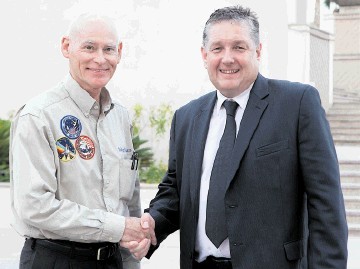
The offshore industry’s workforce wants and needs common global standards to improve safety and competency. And there is a critical, widespread need for companies to develop the kind of corporate cultures necessary to make credible headway with these critical issues.
However, it needs not just collaboration within the industry to achieve these objectives, governments have to step up to the plate too; so warned Opito group chief executive David Doig at the Opito Safety & Competence Conference staged in Abu Dhabi last month.
Doig, who has been hammering away at safety competency for more than a decade, warned 300 or so delegates that tensions around compliance and competence remain.
“There are also issues around managing the safety chain but culture and communications have integral roles to play here,” he said at the Offshore Petroleum Industry Training Organisation event.
“Those companies with the best culture will have the best safety record.
“But being a safety leader not only save lives and avoids injury, it also gives business benefits in terms of increased improvement and sustainability of business performance not forgetting how it enhances reputation, and increased motivation of the workforce.”
Doig said there would be no let-up on the part of Opito, both in terms of its core message and its mission to provide a “pivotal global link” between need and supply.
“The facts relating to the adoption and use of Opito standards now clearly show emerging change in the industry,” he said. “But it’s not enough and much, much more needs to be done.”
But then Doig warned his audience: “However, whatever Opito does, one thing is certain, without pan-industry co-operation and the aligned support of governments and regulators, we will fail in our quest to radically improve safety and competency.
“Failing in our quest is bad enough but failing the great people that work in this industry is worse, much worse, and quite frankly I find that completely unacceptable.”
Doig’s address focused heavily on fresh research carried out on behalf of Opito by Robert Gordon University.
Led by Aberdeen Business School dean, Professor Rita Marcella, this work essentially picks up on earlier research conducted at RGU for Opito.
Drawing on the key messages of The Management of Workforce Safety and Competency in the Oil and Gas Industry report, Doig said that corporate culture emerged as a major factor in determining a company’s approach to competence and HSE issues.
“In setting the goals for this latest piece of research, we wanted to examine how oil and gas companies are managing competence and safety as it relates to their licence to operate and to the management of their largely contractor workforce.
“Our industry has a significant dependence on contractors and the common challenge is knowing and understanding their basic safety and competence levels.”
Doig said that those interviewed said that the development of common systems, recognised certification and accreditation frameworks along with the development of a global assurance programme would significantly help improve safety and competency.
“They want to see a greater exchange of ideas across the industry and better sharing of best practice to improve safety and measure competency,” he said.
“They also suggested we look outside the oil and gas industry and explore what other industries such as nuclear and aviation.”
Another key finding of the Marcella-led work is that some companies complained that the industry did not look far enough ahead in terms of trends in the next five, ten or twenty years.
However, it was clear that the most important factors towards a step-change in safety and competency centred around involving people (the workforce) in the development of systems and placing more emphasis on personal ownership and responsibility.
“One message which resonates across the industry is that safety and competency are significantly affected by an organisation’s culture,” said Doig.
“Traditional barriers, such as respect for elders or those of a higher work status, were identified as posing potential issues in challenging unsafe behaviours and attitudes.
“All interviewees overwhelmingly felt the culture of the business would influence safety and competency development to some extent.
“However, it was felt that this could be overcome through the creation of a strong focus on learning with continuous workforce engagement.
“Teamed with the provision of high quality training and a repeated, repeated, repeated display of management commitment, these barriers could be removed. And it’s really leadership that is needed.”
Doig pointed out that it was disasters that tended to lead to step changes and he cited a role of dishonour:
o 1980 – Alexander Kielland – 123 lost
o 1982 – Ocean Ranger – 84 lost
o 1988 – Piper Alpha – 167 lost
o 2005 – Texas City – 15 lost
o 1998 – Longford – 2 lost
o 2001 – Petrobras P36 – 11 lost
o 2010 – Deepwater Horizon – 11 lost
“We simply must become more pro-active and more joined-up so that we keep our people, our environment, our assets and our reputations safe,” said Doig.